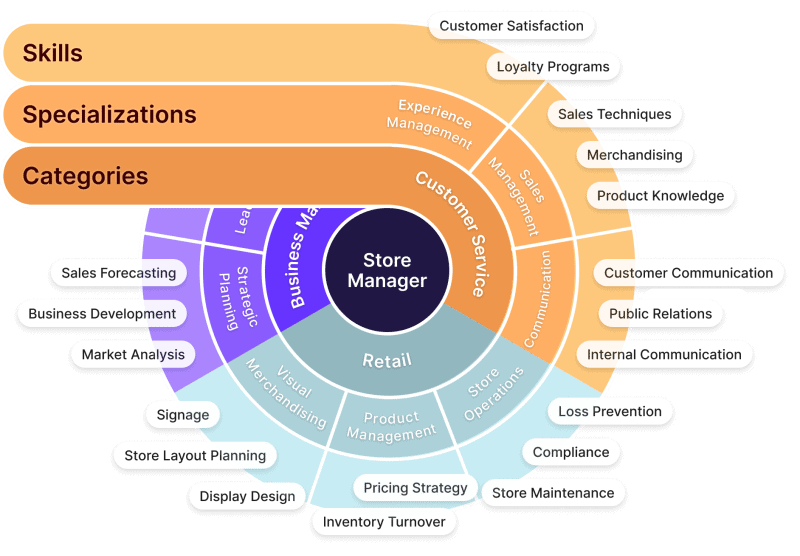Last week we talked about the importance of considering AI skills as a crucial step to increase productivity for companies. As we see more businesses adopting AI in their processes, managers will play a key role in facilitating the adoption of AI for their teams. From making decisions to operations, AI can truly change the dynamics of a team even today but the support of managers is not only needed to make it happen but also to explain how to adopt AI and how to integrate it in the flow of work.
If you manage a team or a department, this article is for you to start thinking about the introduction of AI in your teams.
The role of Artificial Intelligence in decision making
LLMs are quickly gaining traction in the workplace due to their ability to analyze data and provide help in making decisions. More software will integrate LLMs (and AI in general) to facilitate those decisions starting from data and user inputs. That’s where managers should step in to lead their teams in adopting this new way of working. I am not just talking about decisions you might make on a spreadsheet but also about potential decisions that software engineers will make while writing code or product managers while defining the audience for their new feature: we should expect AI to become a strong component of our workflow and teams will need to learn how to use it and when not to rely on it.
Enhancing business decisions with AI and improving
One of the key advantages of AI in decision-making is its capability to identify patterns and trends that humans might miss. By analyzing vast amounts of data, AI algorithms can uncover hidden insights that can significantly impact business decisions. These insights can range from identifying customer preferences to understanding market dynamics, allowing managers to make strategic choices that align with the needs and demands of their target audience. No matter the space you operate in, today this approach can be applied to marketing, product management, finance, operations, and engineering in several industries. Taking advantage of AI in this early phase might be a game changer for your productivity (and to make it more concrete it might also change your P&L with an increase of projects/products delivered and a small headcount) and an opportunity to learn now how to train your people to use AI.
A lot of the initial contribution you might see using AI is on operations (e.g. analyzing data at scale, writing unit tests for your software, optimizing your paid advertising strategy) but the reality is that AI can quickly take a role in all the small business decisions people make every day in their job. It could be a new positioning for your product or the way your finance team presents customer net and gross retention data. These tasks – with the help of AI – take just a fraction of the time your team would have needed to make those decisions but will also expose them (and you as a manager) to potential issues and misunderstandings. That’s why learning how to bring AI into your organization sooner than later will bring several advantages.
Predictive Analysis and AI for management
Another significant contribution of AI in decision making is its ability to perform predictive analysis. By leveraging historical data and identifying patterns, AI algorithms can forecast future outcomes with a high degree of accuracy. This capability allows managers to anticipate customer behavior, predict market trends, build new skills for employees and even evaluate their performance.
For example, AI can analyze customer purchase history, browsing patterns, and demographic data to predict their future buying preferences. This information can help managers tailor their marketing strategies and product offerings to meet the evolving needs of their target audience, ultimately driving sales and customer satisfaction. Similarly, AI can analyze historical sales data and market trends to provide managers with insights into future market conditions. By understanding upcoming trends and potential shifts in the market, managers can adjust their business strategies and stay ahead of the competition.
AI in Risk Management and Mitigation
Risk management is a critical aspect of every business, and AI has emerged as a powerful tool in this domain. By analyzing data in real-time, AI algorithms can effectively identify and mitigate risks before they escalate into significant issues. AI can detect anomalies and patterns that indicate potential risks, such as fraudulent activities or cybersecurity breaches. By continuously monitoring data streams, AI algorithms can alert managers to any suspicious activities, enabling them to take prompt action and prevent potential losses.
AI can also assist in risk assessment and mitigation planning. By analyzing historical data and identifying risk factors, AI algorithms can help managers develop robust risk mitigation strategies, ranging from IT security to hiring and talent acquisition. This proactive approach to risk management can save businesses from potential financial, reputational, and operational damages.
Artificial Intelligence for Improved Efficiency and Productivity
With its ability to automate routine and repetitive tasks, AI is becoming an indispensable tool for managers also for enhancing efficiency and productivity in the workplace.
Automating Routine Tasks with AI
Many managers spend a significant amount of time on routine and repetitive tasks that do not require their full attention. These tasks, such as data entry, report generation, and scheduling, can be easily automated using AI. By leveraging AI-powered software, managers can delegate these mundane tasks to machines, freeing up valuable time to focus on more strategic initiatives.
Imagine a scenario where a manager no longer needs to spend hours manually inputting data into spreadsheets. With AI, data entry can be automated, allowing managers to redirect their efforts towards analyzing and interpreting the data, leading to more informed decision-making.
AI in Project Management
Managing complex projects requires careful planning, coordination, and resource allocation. AI can play a crucial role in assisting managers in these areas, helping them streamline project execution and improve overall success rates.
By analyzing project data, AI algorithms can identify potential roadblocks and bottlenecks, allowing managers to proactively address these issues before they escalate. Additionally, AI can suggest optimal resource allocation based on historical data and project requirements, ensuring that the right people are assigned to the right tasks at the right time.
AI-powered project management tools can provide real-time updates and notifications, keeping managers informed about project progress and milestones. This enables managers to make timely decisions and adjustments, minimizing delays and maximizing efficiency.
AI and Time Management
Time management is a crucial skill for managers to ensure maximum productivity. AI-powered tools can significantly enhance time management capabilities by analyzing time usage patterns and providing valuable recommendations.
Through machine learning algorithms, AI can learn from a manager’s daily activities and identify time-wasting activities. For example, if a manager spends an excessive amount of time in meetings that do not yield significant results, AI can suggest alternative ways to achieve the same objectives, such as virtual meetings or email communication.
AI can assist managers in prioritizing tasks by analyzing deadlines, dependencies, and the manager’s own work patterns. By providing personalized recommendations, AI can help managers allocate their time more effectively, ensuring that critical tasks are completed on time and non-essential activities are minimized.
AI for Team Management and Employee Engagement
AI Tools for Remote Team Management
In today’s remote work environment, managing teams effectively can be challenging. AI tools can aid managers in facilitating communication and collaboration among remote teams. Features such as virtual meeting assistants, automated progress tracking, and virtual team-building activities can help managers keep their teams engaged and productive.
AI in Performance Tracking and Employee Development
Tracking employee performance and providing feedback is essential for their development. AI-powered performance tracking tools can monitor key metrics and provide managers with insights into employee performance. This enables managers to provide timely feedback, identify training needs, and support employee growth.
AI and Employee Engagement Strategies
Employee engagement is crucial for organizational success. AI can play a role in enhancing employee engagement by personalizing employee experiences. AI-powered chatbots can provide personalized recommendations for employee development, address employee concerns, and create a more engaging work environment.
Overcoming Challenges in Implementing AI for Managers
AI presents immense opportunities for managers to excel in today’s dynamic world of work.
By understanding the basics of AI and its various applications, managers can leverage this technology to make informed decisions, improve efficiency, and foster employee engagement.
Said this, the implementation of AI in managerial settings come with its own set of challenges that managers must address to ensure successful integration.
Addressing AI Ethics and Privacy Concerns
As AI technologies become more sophisticated, ethical issues regarding their use and potential biases arise. Managers must ensure that AI systems are designed and implemented in a way that is fair, transparent, and respects individual privacy rights. Additionally, managers should establish clear guidelines and policies for AI use, ensuring that both employees and customers are protected.
Ensuring Smooth AI Integration in Existing Systems
Integrating AI into existing managerial systems can be complex and challenging. Managers must carefully plan and manage the integration process to avoid disruption and ensure a smooth transition. This may involve collaborating with IT professionals and providing training and support to employees to ensure they are equipped to work effectively with AI technologies.
Conclusion
AI is revolutionizing leadership by providing managers with powerful tools and capabilities to enhance decision-making processes, improve management practices, and redefine managerial roles. As AI continues to evolve, managers must embrace its potential and proactively adapt to the changing landscape of leadership.
By effectively leveraging AI technologies and addressing the associated challenges, managers can position themselves as effective leaders in the AI-driven future but they also need to address – and they’ll need more and more in the future – a specific set of challenges that must be faced to ensure the best possible scenario of AI integration within business processes and capabilities.
December 12, 2023


